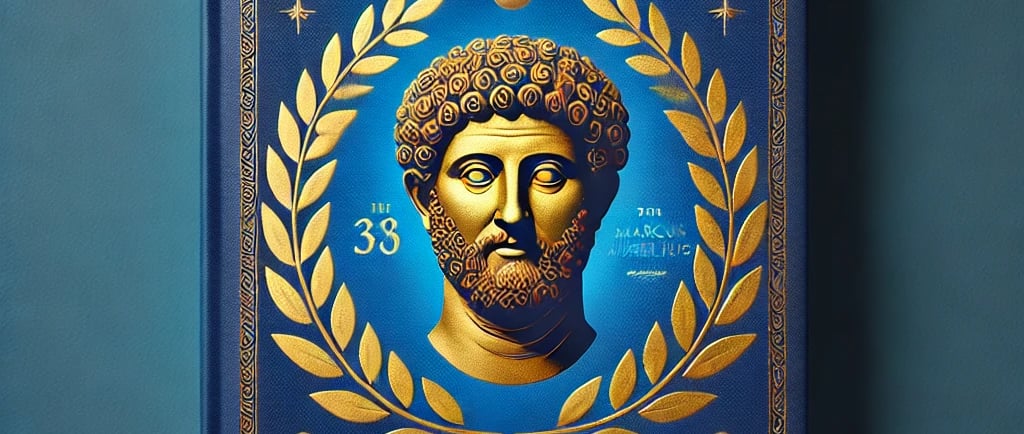Marcus Aurelius: The Philosopher Emperor Who Defined Stoic Leadership
Marcus Aurelius, the 16th Emperor of Rome, left behind a legacy of Stoic wisdom in Meditations, a guide to resilience, self-discipline, and inner peace. His philosophy teaches us to focus on what we can control, lead with integrity, and find strength in adversity. Discover how his timeless insights can help you live a more fulfilling and purposeful life today. 🚀 The Ultimate Edition is now AVAILABLE ON AMAZON http://www.amazon.com/dp/B0FWXYLVJK
BC
3/9/20254 min read
Introduction: The Last Great Emperor of Rome
Few historical figures embody wisdom, resilience, and philosophical depth as completely as Marcus Aurelius, the 16th Emperor of Rome (161–180 CE). Known as the last of the Five Good Emperors, he ruled during a time of turmoil, war, and plague, yet remained a beacon of stoic virtue, justice, and self-discipline. His Meditations, a deeply personal and philosophical work, continues to inspire millions, offering timeless guidance on life, leadership, and inner strength.
Who was Marcus Aurelius beyond the golden statues and imperial titles? How did he balance the weight of an empire with the pursuit of wisdom? And why do modern readers, leaders, and thinkers still turn to his writings for guidance?
Let’s step into the world of Rome’s philosopher-king and uncover the legacy of Marcus Aurelius.
1. The Making of a Philosopher-Emperor
Early Life and Education
Born on April 26, 121 CE, in Rome, Marcus Aurelius was destined for greatness from an early age. Originally named Marcus Annius Verus, he came from a wealthy and politically influential family. However, his path to power was not one of arrogance or excess, but of intellectual rigor and moral discipline.
His brilliance was recognized early by Emperor Hadrian, who saw in him a future leader of Rome. Hadrian arranged for Antoninus Pius (Hadrian’s successor) to adopt Marcus and name him heir to the throne. This placed Marcus in direct line for one of the most powerful positions in the world.
Instead of indulging in luxury, the young Marcus immersed himself in philosophy. He was particularly drawn to Stoicism, a philosophy emphasizing virtue, reason, and endurance in the face of hardship. His tutor, Junius Rusticus, introduced him to the teachings of Epictetus, a former slave-turned-philosopher, whose ideas on resilience, discipline, and self-mastery deeply shaped Marcus’ worldview.
From a young age, he practiced what he preached, adopting a simple lifestyle, sleeping on the ground, and rejecting the lavish comforts of the imperial court.
2. Marcus Aurelius as Emperor (161–180 CE): The Burden of Power
When Antoninus Pius died in 161 CE, Marcus Aurelius ascended to the throne, sharing power with Lucius Verus, his adopted brother. This co-emperorship was a rare occurrence in Rome and showcased Marcus' humility and willingness to share responsibility.
Wars, Plagues, and Unrest
Marcus' reign was far from peaceful. Rome faced constant challenges, including:
The Parthian Wars (161–166 CE) – Rome’s eastern provinces were under attack from the Parthian Empire, forcing Marcus and Verus to lead military campaigns to reclaim lost territory.
The Antonine Plague (165–180 CE) – A devastating pandemic, possibly smallpox, ravaged the empire, killing millions and severely weakening Roman forces.
The Marcomannic Wars (166–180 CE) – Germanic tribes invaded the northern frontiers, forcing Marcus to spend years on the battlefield, personally leading his troops.
Despite these crises, Marcus never abandoned his philosophical principles. He led with justice, humility, and duty, embodying the Stoic ideal of self-restraint in the face of adversity.
"You have power over your mind – not outside events. Realize this, and you will find strength."
– Meditations
3. The Writing of Meditations: A Window into His Soul
One of the greatest gifts Marcus Aurelius left behind is his personal journal, later titled Meditations. This collection of philosophical reflections was never meant for publication – it was a private exercise in self-improvement.
Written during military campaigns, Meditations is a testament to his introspection, resilience, and commitment to virtue. The book offers timeless wisdom on:
Controlling emotions in times of crisis.
Facing death and impermanence with acceptance.
Practicing humility despite great power.
Living in harmony with nature and reason.
Today, Meditations is regarded as one of the greatest philosophical works of all time, influencing leaders, entrepreneurs, athletes, and scholars worldwide.
"Waste no more time arguing about what a good man should be. Be one."
– Meditations
4. The Death of Marcus Aurelius: The End of an Era
By 180 CE, after nearly two decades of war, plague, and governance, Marcus Aurelius’ health declined. He died on March 17, 180 CE, in Vindobona (modern-day Vienna), Austria, likely due to an illness contracted during his military campaigns.
With his death, Rome lost its last great philosopher-king. Tragically, his son and successor, Commodus, was the complete opposite of his father – a corrupt, decadent ruler whose reign ushered in Rome’s decline.
Despite this, Marcus Aurelius' legacy endured. His writings, his leadership, and his philosophy continue to inspire millions.
5. Curiosities About Marcus Aurelius
✔️ He disliked being emperor – Marcus never sought power and viewed ruling as a burden rather than a privilege. He often longed for a quiet life dedicated to philosophy.
✔️ He rejected luxury – Unlike most Roman emperors, Marcus lived modestly, preferring simple clothing, frugal meals, and an uncomplicated lifestyle.
✔️ He was the first emperor to have a co-ruler – Unlike other emperors, he shared power with Lucius Verus, showing his preference for collaboration over dictatorship.
✔️ His reign was one of the most difficult in Roman history – He ruled during wars, invasions, and a devastating pandemic, yet remained calm, just, and principled.
✔️ His equestrian statue still stands today – The famous bronze statue of Marcus Aurelius in Rome’s Capitoline Hill survived because medieval Christians believed it depicted Constantine, the first Christian emperor.
Conclusion: Why Marcus Aurelius Still Matters Today
Marcus Aurelius was more than a Roman emperor—he was a philosopher, warrior, and moral guide whose legacy transcends time. His teachings in Meditations offer profound lessons on resilience, self-discipline, and wisdom that remain relevant in today’s fast-paced, chaotic world.
At a time when power often corrupts, Marcus stood as a rare example of a ruler who lived by virtue, ruled with justice, and remained true to his values. His philosophy teaches us that:
✅ Happiness is found in self-mastery.
✅ External events don’t control us—our reactions do.
✅ Leadership should be grounded in humility and wisdom.
For those seeking clarity, strength, and inner peace, Meditations remains a guiding light—just as it was for the great emperor who wrote it.
Get Your Copy of Meditations: choose Hardcover, Paperback or Ebook!
Looking to dive deeper into the wisdom of Marcus Aurelius? Explore our handpicked editions of Meditations at CenturiesPublisher.com and start your journey toward stoic resilience and lasting wisdom.
Get Previews & News
© 2025. All rights reserved.




